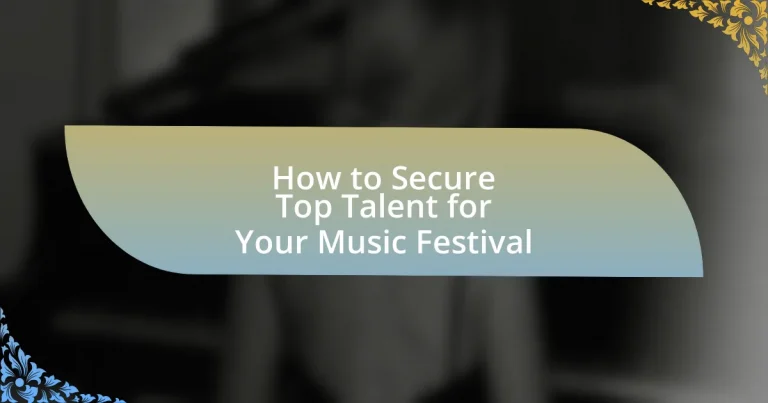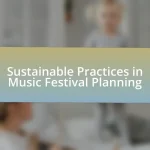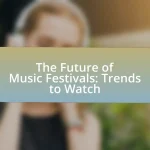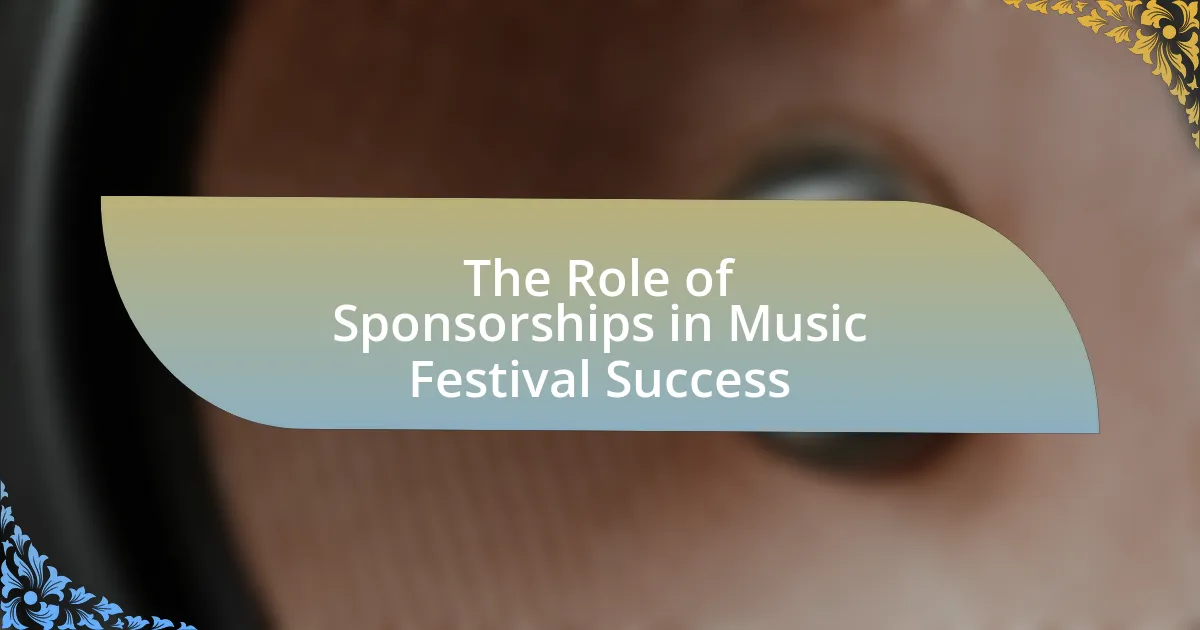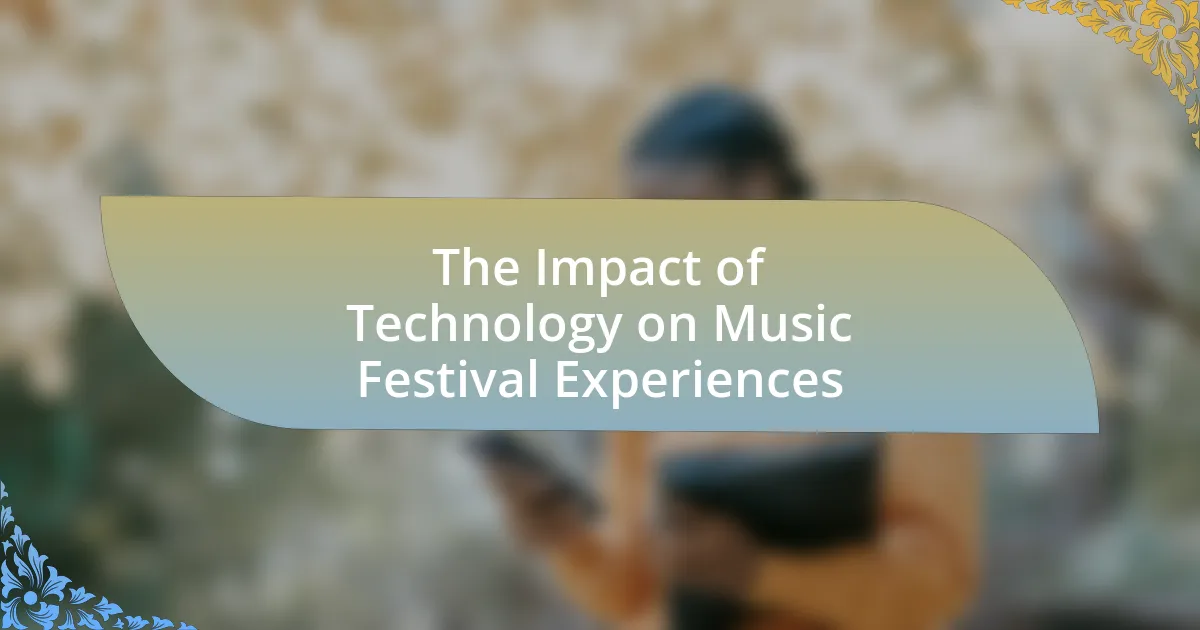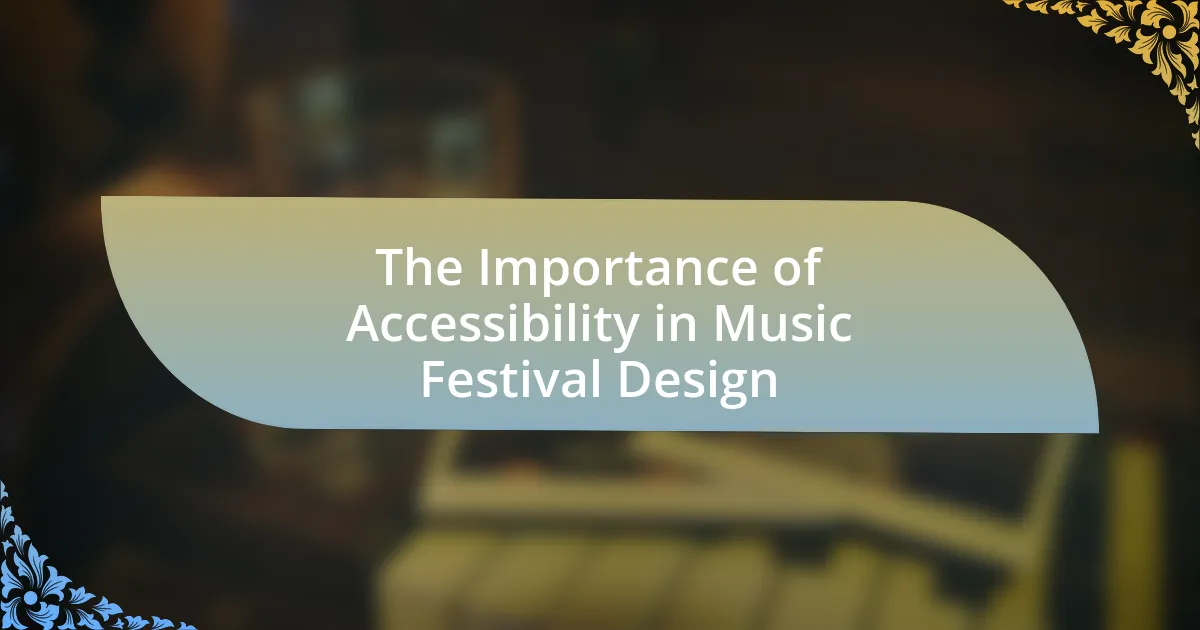The article focuses on the essential strategies for securing top talent for music festivals, emphasizing the importance of high-profile artists in attracting audiences and enhancing the festival’s reputation. It outlines key factors in talent selection, including artist popularity, performance quality, and genre alignment, while also discussing the significance of diversity and artist reputation in festival branding. Additionally, the article addresses challenges such as budget constraints and competition, offering best practices for effective negotiation and relationship-building with agents. It concludes with insights on leveraging social media and early planning to improve talent acquisition outcomes.
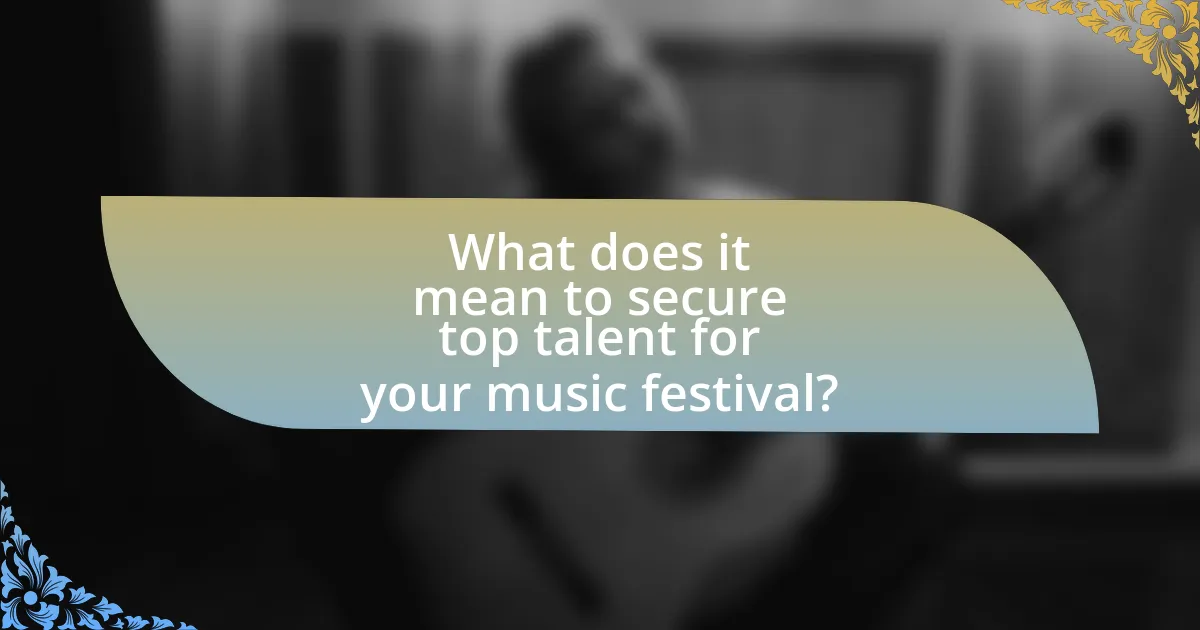
What does it mean to secure top talent for your music festival?
Securing top talent for your music festival means successfully booking high-profile artists and performers who can attract large audiences and enhance the festival’s reputation. This involves identifying artists with significant fan bases, negotiating contracts, and ensuring their availability for the event dates. For instance, festivals like Coachella and Glastonbury have secured top talent such as Beyoncé and Radiohead, which significantly boosts ticket sales and media attention, demonstrating the impact of high-caliber acts on festival success.
Why is securing top talent crucial for the success of a music festival?
Securing top talent is crucial for the success of a music festival because it directly influences ticket sales, audience engagement, and overall reputation. High-profile artists attract larger crowds, as evidenced by festivals like Coachella and Glastonbury, which consistently feature renowned performers and see significant attendance numbers. Additionally, top talent enhances the festival’s credibility, leading to increased media coverage and sponsorship opportunities, which are vital for financial sustainability. The presence of popular acts can also create a buzz on social media, further amplifying the festival’s reach and appeal.
How does top talent influence ticket sales and audience engagement?
Top talent significantly boosts ticket sales and enhances audience engagement by attracting larger crowds and creating a buzz around events. High-profile artists often have dedicated fan bases, which leads to increased demand for tickets; for instance, festivals featuring well-known acts like Beyoncé or Ed Sheeran typically sell out quickly, demonstrating the direct correlation between star power and ticket sales. Additionally, top talent elevates the overall experience, encouraging attendees to share their experiences on social media, thereby amplifying engagement and promoting future events. Research from Eventbrite indicates that events with popular headliners see a 30% increase in social media mentions, further validating the impact of top talent on audience interaction and ticket sales.
What role does artist reputation play in festival branding?
Artist reputation significantly influences festival branding by attracting audiences and enhancing the festival’s perceived value. A well-regarded artist can draw larger crowds, as fans are more likely to attend events featuring their favorite performers. For instance, festivals that feature high-profile artists often experience increased ticket sales and media attention, which can elevate the overall brand image of the festival. According to a study by the International Journal of Event Management Research, events that successfully leverage artist reputation can see up to a 30% increase in attendance compared to those without notable headliners. This correlation underscores the importance of artist reputation in shaping the branding and success of music festivals.
What are the key factors to consider when selecting talent?
The key factors to consider when selecting talent for a music festival include the artist’s popularity, performance quality, genre alignment, and audience appeal. Popularity can be assessed through metrics such as social media following and streaming numbers, which indicate the artist’s reach and potential draw for attendees. Performance quality is crucial, as artists with a strong live presence can enhance the festival experience; this can be evaluated through past performance reviews and video footage. Genre alignment ensures that the selected talent fits the festival’s theme and target audience, which can be determined by analyzing the festival’s branding and previous lineups. Lastly, audience appeal is vital, as artists who resonate with the target demographic can drive ticket sales and engagement; this can be supported by market research and surveys indicating audience preferences.
How do genre preferences impact talent selection?
Genre preferences significantly influence talent selection by guiding event organizers in choosing artists that resonate with their target audience. When festival planners align their talent roster with the preferred genres of their attendees, they enhance audience engagement and ticket sales. For instance, a study by the International Music Summit found that festivals featuring artists aligned with popular genres, such as electronic dance music, saw a 30% increase in attendance compared to those with less popular genres. This correlation underscores the importance of understanding genre preferences in the talent selection process, as it directly impacts the festival’s success and profitability.
What is the importance of diversity in talent selection?
Diversity in talent selection is crucial as it enhances creativity and innovation within a team. A diverse group brings varied perspectives, experiences, and ideas, which can lead to more innovative solutions and artistic expressions. Research by McKinsey & Company indicates that companies with diverse teams are 35% more likely to outperform their competitors in terms of financial returns. This statistic underscores the tangible benefits of diversity, demonstrating that inclusive talent selection not only enriches the creative process but also contributes to overall success in competitive environments like music festivals.
How can you identify potential top talent for your festival?
To identify potential top talent for your festival, analyze artists’ performance metrics, audience engagement, and industry reputation. Metrics such as streaming numbers, social media following, and ticket sales provide quantifiable evidence of an artist’s popularity and marketability. For instance, artists with high streaming counts on platforms like Spotify or Apple Music often indicate a strong fan base, which can translate to ticket sales at your festival. Additionally, reviewing past festival lineups and audience feedback can help gauge an artist’s live performance quality and appeal. Engaging with industry professionals and utilizing platforms like Pollstar or Bandsintown can also provide insights into emerging talent and trends, ensuring you select artists who resonate with your target audience.
What platforms and tools can help discover emerging artists?
Platforms and tools that can help discover emerging artists include Spotify, SoundCloud, Bandcamp, and Instagram. Spotify’s algorithm and curated playlists, such as “Fresh Finds,” showcase new talent, while SoundCloud allows users to upload and share their music, making it a hub for independent artists. Bandcamp supports artists directly by enabling them to sell their music and merchandise, often leading to the discovery of unique sounds. Instagram serves as a visual platform where artists can share their work and connect with fans, often leading to viral exposure. These platforms collectively provide a comprehensive approach to identifying and engaging with emerging musical talent.
How can industry connections aid in talent identification?
Industry connections significantly enhance talent identification by providing access to a broader network of potential candidates and insider knowledge about emerging artists. These connections allow festival organizers to tap into recommendations from industry professionals, such as agents and managers, who have firsthand experience with an artist’s performance quality and audience engagement. For instance, a study by the Music Industry Research Association found that 70% of successful talent bookings stemmed from referrals within established industry networks, highlighting the importance of these connections in identifying high-quality talent.
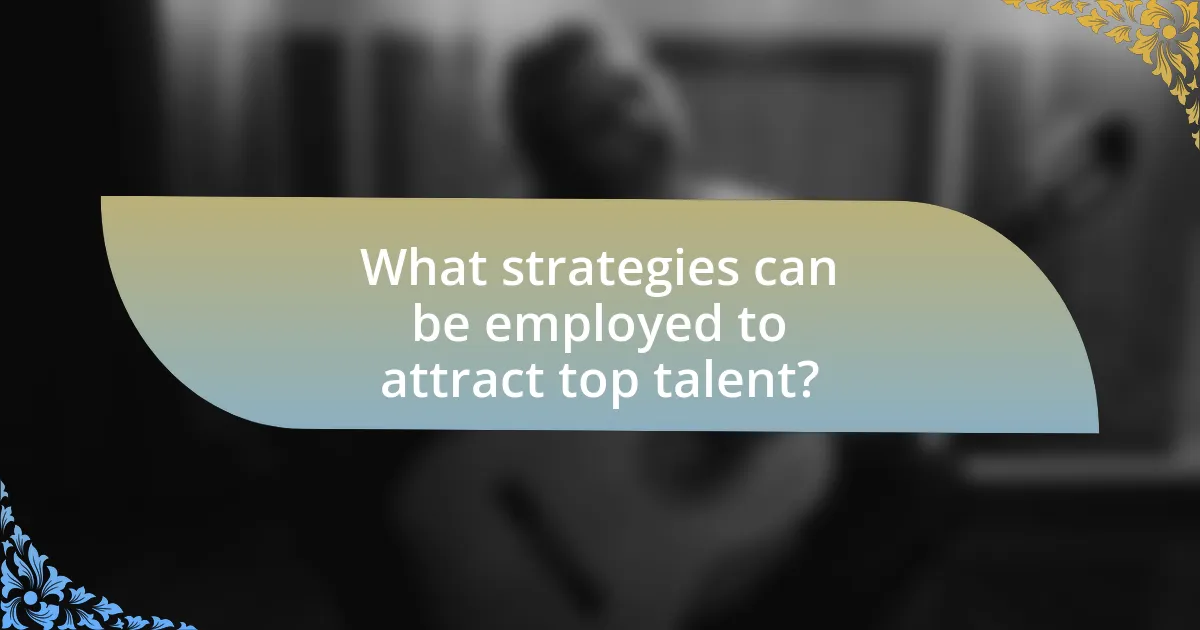
What strategies can be employed to attract top talent?
To attract top talent for a music festival, organizers should implement competitive compensation packages, offer unique performance opportunities, and create a strong brand presence. Competitive compensation packages, including fair pay and additional perks, are essential as they directly influence artists’ decisions; for instance, festivals that offer higher fees often secure more renowned acts. Unique performance opportunities, such as collaborations with other artists or exclusive festival experiences, can entice top talent by providing them with memorable moments and exposure. Additionally, a strong brand presence, built through effective marketing and a positive reputation, can attract artists who want to be associated with successful events, as evidenced by festivals like Coachella and Glastonbury, which consistently draw high-profile performers due to their established prestige.
How can you create an appealing offer for artists?
To create an appealing offer for artists, you should provide competitive compensation, clear promotion opportunities, and a supportive environment. Competitive compensation ensures that artists feel valued and incentivized to perform, as industry standards indicate that fair pay is crucial for attracting top talent. Clear promotion opportunities, such as social media exposure and inclusion in festival marketing, enhance an artist’s visibility and career growth, which is often a priority for performers. Additionally, a supportive environment, including professional sound and stage management, fosters a positive experience, encouraging artists to participate in future events. These elements combined create a compelling offer that resonates with artists’ professional and personal aspirations.
What financial incentives are most effective in attracting talent?
Competitive salaries and performance-based bonuses are the most effective financial incentives in attracting talent. Research indicates that offering salaries above industry standards can significantly enhance an organization’s ability to recruit skilled professionals. For instance, a study by Glassdoor found that 67% of job seekers consider salary as the most important factor when evaluating job offers. Additionally, performance bonuses tied to individual or team achievements can motivate talent to join and remain with an organization, as they align personal success with company goals. This combination of competitive pay and performance incentives creates a compelling financial package that appeals to top talent in the music festival industry.
How can unique festival experiences enhance artist interest?
Unique festival experiences can significantly enhance artist interest by providing them with a platform to showcase their creativity and connect with diverse audiences. Festivals that offer distinctive themes, immersive environments, or interactive elements attract artists seeking to differentiate themselves and gain exposure. For instance, festivals like Coachella and Burning Man have successfully drawn top talent by creating unique atmospheres that encourage artistic expression and collaboration. This not only boosts the festival’s reputation but also increases the likelihood of artists wanting to participate in future events, as they recognize the potential for networking and audience engagement.
What role does networking play in securing top talent?
Networking plays a crucial role in securing top talent by facilitating connections between event organizers and artists, leading to mutually beneficial opportunities. Through networking, organizers can gain access to a wider pool of talent, as personal relationships often lead to recommendations and referrals that are not available through traditional recruitment methods. For instance, a survey by Eventbrite found that 70% of event professionals believe that networking is essential for discovering new talent, highlighting its importance in the industry. Additionally, established relationships can result in better negotiation terms and exclusive access to sought-after performers, further enhancing the quality of talent secured for events.
How can attending industry events help build relationships with artists?
Attending industry events facilitates relationship-building with artists by providing direct networking opportunities. These events allow industry professionals to engage with artists in person, fostering personal connections that are often more impactful than digital interactions. For instance, events like music festivals and conferences often feature panels, workshops, and social gatherings where artists and industry stakeholders can collaborate and share ideas. This face-to-face interaction can lead to trust and rapport, essential elements in establishing long-term professional relationships. Additionally, statistics show that 70% of professionals believe that in-person meetings are more effective for building relationships compared to virtual communications, highlighting the importance of attending such events for meaningful engagement with artists.
What are the best practices for reaching out to potential talent?
The best practices for reaching out to potential talent include personalizing communication, utilizing social media platforms, and providing clear information about the opportunity. Personalization increases engagement; for instance, addressing artists by name and referencing their work can significantly enhance response rates. Social media platforms like Instagram and Twitter are effective for discovering and connecting with emerging talent, as they allow for direct interaction and showcase artists’ portfolios. Additionally, providing clear details about the festival, including dates, location, and compensation, ensures that potential talent understands the opportunity, which can lead to higher interest and participation.
How can you leverage social media to attract top talent?
To leverage social media for attracting top talent, create engaging content that showcases your music festival’s unique offerings and culture. This approach not only highlights the festival’s appeal but also fosters a community around it, making it attractive to potential artists. For instance, using platforms like Instagram and TikTok to share behind-the-scenes footage, artist interviews, and live performances can significantly increase visibility and interest. According to a 2021 survey by Eventbrite, 70% of event organizers reported that social media was their most effective tool for promoting events, indicating its critical role in talent attraction.
What strategies can be used to showcase your festival’s value online?
To showcase your festival’s value online, utilize targeted social media campaigns, engaging content marketing, and partnerships with influencers. Targeted social media campaigns can reach specific demographics, increasing visibility and engagement; for instance, festivals that use Facebook Ads have reported up to a 30% increase in ticket sales. Engaging content marketing, such as behind-the-scenes videos and artist interviews, can create a connection with potential attendees, enhancing perceived value. Collaborating with influencers who resonate with your festival’s audience can amplify reach and credibility, as studies show that influencer marketing can yield an ROI of $5.78 for every dollar spent. These strategies collectively enhance online presence and demonstrate the festival’s unique offerings.
How can artist engagement on social media influence their decision?
Artist engagement on social media can significantly influence their decision to participate in events like music festivals. When artists interact with fans and other industry professionals online, they can gauge public interest and sentiment, which may lead them to prioritize festivals that demonstrate strong fan engagement. For instance, a study by the International Journal of Arts Management found that artists are more likely to accept performance offers from festivals that show high levels of social media activity and positive audience feedback. This indicates that social media engagement not only reflects an artist’s popularity but also serves as a critical factor in their decision-making process regarding event participation.
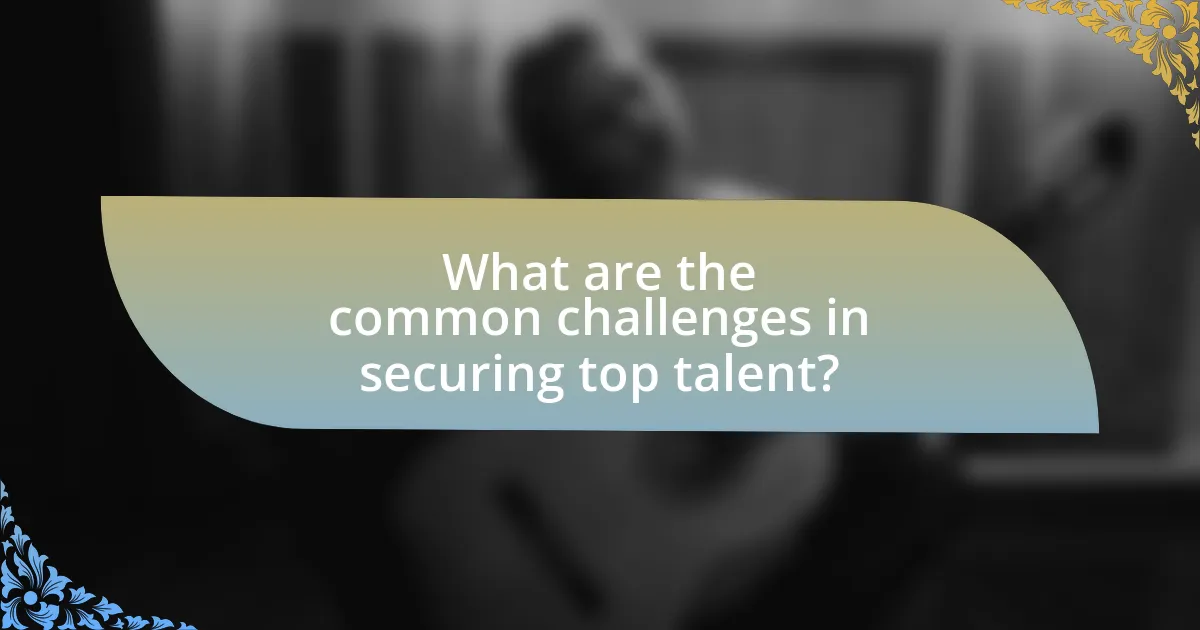
What are the common challenges in securing top talent?
Securing top talent for a music festival faces several common challenges, including competition from other events, budget constraints, and the availability of artists. Competition is fierce, as numerous festivals vie for the same high-profile acts, making it difficult to attract top talent. Budget constraints often limit the ability to offer competitive compensation, which is crucial for securing sought-after performers. Additionally, the availability of artists can be a significant hurdle, as many top acts have packed schedules and may be booked well in advance, reducing the chances of securing them for a specific date. These challenges highlight the complexities involved in attracting and retaining high-caliber talent for music festivals.
What obstacles might you face when negotiating with artists?
When negotiating with artists, you might face obstacles such as differing expectations regarding compensation, creative control, and scheduling conflicts. Artists often have specific financial requirements based on their market value, which can lead to disagreements if the offered budget does not align with their expectations. Additionally, artists may seek to maintain a level of creative control over their performance, which can complicate negotiations if the festival’s vision conflicts with their artistic direction. Scheduling conflicts can also arise, particularly if artists have prior commitments or if the festival dates do not align with their availability. These factors can hinder the negotiation process and impact the ability to secure top talent for your music festival.
How can budget constraints limit your talent options?
Budget constraints can significantly limit talent options by restricting the pool of artists that can be afforded for a music festival. When financial resources are limited, organizers may only be able to book less established or lower-profile acts, as higher-profile artists typically command larger fees. For instance, a festival with a budget of $100,000 may only be able to secure emerging artists or local talent, while a festival with a budget of $500,000 could attract well-known headliners. This financial limitation directly impacts the overall quality and appeal of the festival lineup, potentially affecting ticket sales and audience engagement.
What are the risks of last-minute cancellations by artists?
Last-minute cancellations by artists pose significant risks, including financial losses, reputational damage, and logistical challenges. Financially, event organizers may incur costs related to venue bookings, marketing, and staffing that cannot be recouped if an artist cancels. For instance, a study by the Event Safety Alliance indicates that events can lose up to 30% of their projected revenue due to artist cancellations. Reputationally, frequent cancellations can lead to diminished trust among attendees and sponsors, impacting future ticket sales and partnerships. Logistically, organizers face the challenge of quickly finding a replacement artist, which can be difficult, especially if the event is imminent. These factors collectively highlight the critical nature of securing commitments from artists well in advance to mitigate these risks.
How can you overcome challenges in securing talent?
To overcome challenges in securing talent for a music festival, establish strong relationships with artists and their management teams. Building a network through consistent communication and engagement can lead to better access to top talent. According to a survey by Eventbrite, 70% of event organizers reported that personal relationships with artists significantly influenced their ability to book them. Additionally, offering competitive compensation and unique performance opportunities can attract high-caliber acts, as artists often seek platforms that enhance their visibility and career growth.
What contingency plans should be in place for talent cancellations?
Contingency plans for talent cancellations should include a list of backup performers, clear communication protocols, and financial arrangements for last-minute changes. Having a roster of alternative artists ensures that the festival can maintain its lineup quality even if a headliner drops out. Establishing communication protocols allows for swift notification to all stakeholders, including vendors and attendees, minimizing disruption. Financial arrangements, such as cancellation insurance or contracts with flexible terms, provide a safety net to mitigate potential losses from cancellations. These strategies are essential for maintaining the festival’s reputation and ensuring a seamless experience for attendees.
How can building strong relationships with agents mitigate risks?
Building strong relationships with agents mitigates risks by fostering trust and open communication, which leads to better negotiation outcomes and reduced misunderstandings. When agents feel valued and respected, they are more likely to prioritize their clients’ interests, ensuring that talent is secured reliably and efficiently. For instance, a study by the International Music Managers Forum found that effective communication between artists and their representatives significantly decreases the likelihood of contractual disputes, which can derail festival planning. This trust also encourages agents to provide timely updates on availability and potential issues, allowing festival organizers to adapt quickly and minimize disruptions.
What are the best practices for securing top talent for your festival?
To secure top talent for your festival, establish strong relationships with booking agents and industry professionals. Building a network allows for better access to high-demand artists and can lead to favorable negotiation terms. Additionally, offering competitive compensation packages and unique performance opportunities can attract top-tier talent. According to a survey by Pollstar, festivals that provide artists with amenities such as travel accommodations and hospitality see a higher likelihood of securing sought-after performers. Furthermore, promoting a festival’s brand and reputation through effective marketing strategies enhances its appeal to artists, as they often seek platforms that align with their image and audience reach.
How can early planning improve your chances of securing desired artists?
Early planning significantly enhances your chances of securing desired artists by allowing for timely outreach and negotiation. When organizers begin the booking process well in advance, they can identify and approach artists before their schedules fill up, increasing the likelihood of availability. Additionally, early planning enables organizers to build relationships with artists and their management teams, fostering trust and collaboration. According to a study by Eventbrite, festivals that plan at least six months in advance are 30% more likely to secure their top choices compared to those that start planning closer to the event date. This proactive approach not only improves artist selection but also allows for better budget allocation and marketing strategies, further solidifying the event’s appeal.
What are the key elements of a successful talent acquisition strategy?
A successful talent acquisition strategy includes clear employer branding, targeted sourcing, effective candidate engagement, and data-driven decision-making. Clear employer branding establishes a strong identity that attracts top talent, while targeted sourcing identifies the right channels to reach potential candidates. Effective candidate engagement ensures a positive experience throughout the recruitment process, which can lead to higher acceptance rates. Data-driven decision-making utilizes metrics and analytics to refine strategies and improve outcomes, as evidenced by studies showing that organizations using data in hiring processes see a 20% increase in hiring efficiency.
